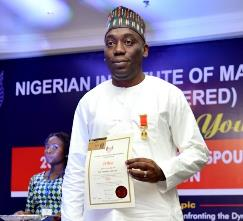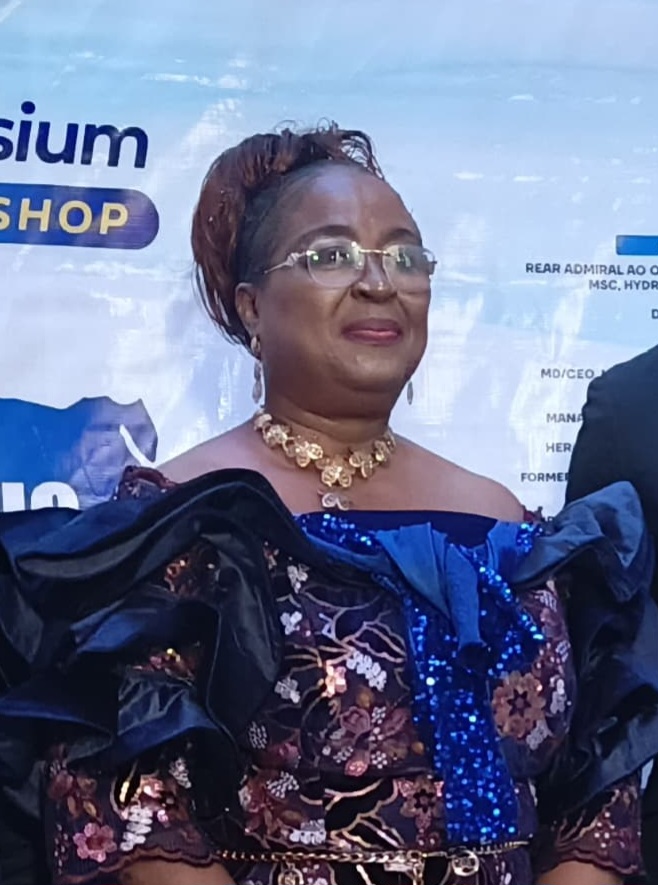By Felicia Chinwe Mogo
It is with immense pride and great optimism that I stand before you today at this critical gathering of minds, united by our shared commitment to achieving sustainable blue growth in Africa, particularly in the context of our rapidly changing climate. As we continue to explore the vast opportunities that the blue economy presents, it is imperative that we also reflect on the direction we, as a community, are taking and the future targets we must set to realize our collective vision for Africa’s oceans and coastal communities.
The African Marine Environment Sustainability Initiative (AFMESI) was founded on a core mission: to ensure the sustainable management and conservation of our marine and coastal environments while fostering economic growth that benefits not just businesses but also the millions of people whose livelihoods depend on these precious resources. Over the years, AFMESI has championed numerous projects and initiatives in Nigeria and across Africa, aimed at protecting our marine ecosystems, empowering coastal communities, and advancing policy frameworks that support sustainable marine practices
However, as we look ahead, it is clear that our work is far from finished. Climate change, biodiversity loss and unsustainable exploitation of marine resources continue to threaten the health of our oceans and the well-being of the communities that rely on them. Today, I want to outline some of the future targets of AFMESI framed by our five-year strategic plan which is built on five key pillars: Engagements and Relationships; Science and Research; Advocacy and Implementation; Communication, Fundraising and Organizational Foundation. This is our roadmap for the next phase of action as we continue to navigate these challenges and pursue our vision of a resilient, sustainable, and inclusive blue economy.
1. Strengthening Coastal Community Integration in Blue Economy Initiatives
Our first target is to deepen the integration of coastal communities into blue economy strategies. The communities that live and work by the sea are the frontline defenders of our marine environments, and their involvement is crucial for the success of any sustainable initiative. AFMESI will expand its community-based projects, offering training, resources and support to empower local populations to take an active role in managing their marine resources. This will include enhancing their capacity for sustainable fishing practices, ecotourism, and marine conservation efforts, ensuring they are not left behind in the global blue economy transition.
2. Promoting Innovation and Technology for Marine Sustainability
Innovation and technology will be at the heart of AFMESI’s future agenda. We will actively promote the development and adoption of cutting-edge technologies that can drive sustainable ocean management, either through improved data collection on marine health, advanced monitoring systems for illegal fishing, or renewable energy projects in coastal areas. In collaboration with our partners, we will support research and innovation hubs that focus on ocean science, climate adaptation, and blue economy solutions that cater to the unique needs of Africa’s coastal regions.
3. Expanding Marine Conservation Efforts through Public and Private Partnerships
AFMESI has long recognized the importance of marine conservation in ensuring the long-term health of our oceans. Our future target is to significantly expand our marine conservation projects through strengthened partnerships with governments, international organizations and the private sector. By creating Marine Protected Areas (MPAs), restoring critical habitats like mangroves and coral reefs and reducing marine pollution, we aim to enhance biodiversity and build resilience against the impacts of climate change. In the coming years, we will advocate for more robust policies that protect marine ecosystems while fostering sustainable economic growth.
4. Addressing Climate Change and Building Ocean Resilience
Climate change remains one of the most significant threats to our oceans and coastal communities. Rising sea levels, ocean acidification and increasing storm intensity are just a few of the challenges we face. AFMESI is committed to leading the charge in climate adaptation and mitigation strategies for coastal and marine environments. Our target is to develop and implement comprehensive resilience plans that safeguard vulnerable coastal regions from the worst impacts of climate change while ensuring that local economies can thrive in this new reality. We will collaborate with regional and international bodies to build resilient marine infrastructure and protect critical habitats.
5. Building Capacity through Education, Training, and Policy Advocacy
To achieve sustainable blue growth, we must invest in education and capacity- building at all levels. AFMESI will continue to offer training programs for policymakers, stakeholders, and the youth, equipping them with the skills and Knowledge needed to drive effective ocean governance and sustainable practices. We will also ramp up our policy advocacy efforts, pushing for stronger international cooperation, enforcement of maritime laws and alignment with global standards such as the United Nations Sustainable Development Goals (SDGs) and the African Union’s Agenda 2063.
6. Ensuring Gender Equality and Youth Empowerment in Blue Growth
Gender equality and youth empowerment will remain central to AFMESI’s future targets. We recognize that women and young people are critical actors in the blue economy and must be empowered to lead in this space. AFMESI will continue to advocate for gender-inclusive policies that support women’s participation in fisheries, marine conservation, and ocean governance. We will also provide platforms for young people to innovate and lead in blue economy initiatives, creating opportunities for them to drive the future of Africa’s marine sector.
7. Establishing Financial Mechanisms for Sustainable Blue Economy Development
It is our desire and support will be key to achieving our ambitious goals. AFMESI will work finally, financing towards establishing innovative financing mechanisms that support blue economy projects across Africa. We aim to attract investment in sustainable ocean industries, from eco-friendly aquaculture to renewable marine energy, and to ensure that these investments benefit the communities most in need. We will work with financial institutions, development partners, and private investors to unlock new funding streams for the sustainable use of our marine resources.
Furthermore, the actionable points that emerge from this symposium’s paper presentations and fire-side discussion sessions will be consolidated into a communiqué. This communiqué will serve as a roadmap for the future, outlining clear steps that we will actively implement to achieve the objectives discussed. Our collective ideas and solutions will not remain mere words but will drive tangible progress as we move forward together.
In conclusion, the future of AFMESI lies in our ability to adapt, innovate and collaborate. Achieving blue growth in a changing climate will require collective action from all stakeholders; governments, the private sector, academia, civil society and coastal communities alike. Our targets are ambitious, but they are achievable. Together, we can build a blue economy that is sustainable, inclusive, and resilient, ensuring that our oceans remain a source of life, livelihood, and prosperity for generations to come.
Thank you all for your continued support and commitment to this cause. I look forward to working alongside you as we chart the course for the future of Africa’s marine environment.
*Dr. (Mrs.) Felicia Chinwe Mogo, President and Founder, African Marine Environment Sustainability Initiative (AFMESI) presented this as her welcome address at the 4th annual symposium and workshop organized by AFMESI in Lagos…recently.











